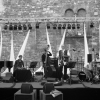Home » Jazz Articles » Album Review » Roberto Bonati + ParmaFrontiere Orchestra: La fòla de l’...
Roberto Bonati + ParmaFrontiere Orchestra: La fòla de l’oca/Overtime
A glance at the instrumentation used on La fòla de l'oca/Overtime indicates that any fan anticipating tightly-written horn charts and blistering solos set to a driving rhythm section will be disappointed. Instead, Bonati makes full use of his four-piece rhythm section along with a string quartet to create incredibly rich harmonic textures from which solos emerge organically in service of his compositions. As illustration of Bonati's abilities listen to the series of crescendos and diminuendos on "Quid est ergo tempus" and the way Giulia Zaniboni's voice is used to suggest the lone individual contemplating time's all too fleeting passage. Later on in this piece, Andrea Grossi's bass offers a rhythmic counterpoint to the orchestra's playing of the main theme. This simple device is hugely effective musically, suggesting perhaps how we experience present time as something more than a brief fragmentary moment in our existence.
"Quid est ergo tempus" is a fine example of 'how to do' extended composition in jazz. Indeed, the same would apply to several of these seven tracks, notably "Potamós" and "Amid Time." A further example comes at the end of the final track, "Aión." Bonati follows Fabius Mey's trombone solo with a long exposition of the theme by the whole ensemble. A lesser composer might have settled for the obvious tutti finale. Bonati, however, closes with the Zaniboni's unaccompanied voice to fashion the perfect ending to the piece and to the whole performance.
But it is also intriguing how Bonati makes use of a simpler song-based form on "Achanès tu aiónos" maintaining compositional interest throughout without just relying on the creative imagination of his soloists. The rubato opening is just the beginning but the way that the orchestra, rather than just rhythm section, offers harmonic support behind with Michael Gassmann's trumpet or behind Zaniboni's voice adds a whole other dimension. Elsewhere, on "Potamós" for example, the techniques Bonati uses owe much more to contemporary composition than to more familiar jazz-based approaches. There is almost something Zappa-esque—and highly effective -about the piece with its use of rhythmic counterpoint, contrary motion and dissonant harmonies. It is not so much goal-directed as internally focused on the unfolding of its own musical processes—time experienced rather than time passing. If the colours Bonati uses in the main tend towards the autumnal, not only is this appropriate to his subject but these tones are used to produce music that seems to envelope the listener in their warm embrace. An astonishingly beautiful record.
Track Listing
Quid est ergo tempus; Achanès tu aiónos; Apidón eis to tachos; In te anime meus; Potamós; Amid Time; Aión.
Personnel
Roberto Bonati
composer / conductorGuila Zaniboni
vocalsLuca Perciballi
guitarTommaso Salvadori
vibraphoneAndrea Grossi
bass, acousticRoberto Dani
drumsFabius Mey
tromboneMarco Arcari
oboeMarco Ignoti
clarinetRiccardo Luppi
woodwindsSimon Andreas Fredheim Folkvord
saxophone, altoBenjamin Löfgren
trumpetMichael Gassmann
trumpetSimon Herberholz
saxophone, tenorAdditional Instrumentation
Finn Henrik Stamer, Ingrid Berg Mehus (violin); Paolo Botti (viola); Gregorio Buti (cello).
Album information
Title: La fòla de l’oca/Overtime | Year Released: 2023 | Record Label: Parma Frontiere
Tags
About Roberto Bonati
Instrument: Composer / conductor
PREVIOUS / NEXT
Support All About Jazz
 All About Jazz has been a pillar of jazz since 1995, championing it as an art form and, more importantly, supporting the musicians who make it. Our enduring commitment has made "AAJ" one of the most culturally important websites of its kind, read by hundreds of thousands of fans, musicians and industry figures every month.
All About Jazz has been a pillar of jazz since 1995, championing it as an art form and, more importantly, supporting the musicians who make it. Our enduring commitment has made "AAJ" one of the most culturally important websites of its kind, read by hundreds of thousands of fans, musicians and industry figures every month.


























